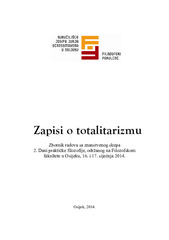Приказ основних података о документу
Prosvetiteljstvo i totalitarizam
Enlightenment and Totalitarianism
| dc.contributor.editor | Krivak, Marijan | |
| dc.contributor.editor | Senković, Željko | |
| dc.creator | Krstić, Predrag | |
| dc.date.accessioned | 2017-11-01T10:16:28Z | |
| dc.date.available | 2017-11-01T10:16:28Z | |
| dc.date.issued | 2014 | |
| dc.identifier.isbn | 978-953-314-072-8 | |
| dc.identifier.uri | http://rifdt.instifdt.bg.ac.rs/123456789/664 | |
| dc.description.abstract | Namera je izlaganja da isprati istoriju povezivanja pojmova "prosvetiteljstvo" i "totalitarizam", povezivanja koja nastupa iza Drugog svetskog rata i koje nastoji da idejne korene dvadesetovekovnih totalitarnih formacija pronađe u osamnaestovekovnoj lektiri. Manje će nas interesovati opravdanost ovakvog istorijskog antedatiranja porekla totalitarizma, a više heuristička plodnost podrazumevanja njegove veze sa prosvetiteljstvom u savremenim teorijskim elaboracijama i kritikama (radikalnog) kolektivizma. Zaključna bi sugestija bila da razumevanje prosvetiteljstva, naizgled paradoksalno, odlučuje o sudbini totalitarizma: kao što se u jednom registru "projektu" prosvetiteljstva sasvim umesno može pripisati krivica za savremene totalitarne režime i tendencije, tako se u drugom, jednako ubedljivo, tek u investiranju u nedovršene ili krivotvorene ideale prosvećivanja, pronalazi protivotrov imperijalnim, kolonizatorskim, hegemonim i diskriminatorskim strategijama i praksama misaonih i društvenih formacija moderne. | |
| dc.description.abstract | The aim of this paper is to outline the history of bringing the concepts of "enlightenment" and "totalitarianism" into connection. The linkage of the two concepts occurred after the Second World War, in the attempt to find the ideological roots of totalitarian formations of the twentieth century in the literature of the eighteenth century. Our interest will be less focused on the viability of this historical back-dating of the origin of totalitarianism, and more on the heuristic fruitfulness of assuming its connection with the enlightenment in contemporary theoretical elaborations and criticisms of (radical) collectivism. The final part of the article suggests that the understanding of the Enlightenment, seemingly paradoxically, decides the destiny of totalitarianism: on one hand, it is quite appropriate to attribute the responsibility for the modern totalitarian tendencies to the enlightenment "project"; on the other hand, equally compellingly, it may be claimed that the investment is incomplete or falsified ideals of enlightenment represent the antidote to imperial, colonial, hegemonic and discriminatory policies and practices of modern thought- and social-formations. | |
| dc.language | cro | |
| dc.publisher | Osijek : Filozofski fakultet Osijek, Sveučilište Josipa Jurja Strossmayera | |
| dc.rights.uri | https://creativecommons.org/licenses/by-nc-nd/4.0/ | |
| dc.source | Zapisi o totalitarizmu. Zbornik radova sa znanstvenog skupa 2. Dani praktičke filozofije, održanog na Filozofskom fakultetu u Osijeku, 16. i 17. siječnja 2014. | cro |
| dc.subject | totalitarizam | |
| dc.subject | prosvetiteljstvo | |
| dc.subject | totalitarianism | |
| dc.subject | enlightenment | |
| dc.title | Prosvetiteljstvo i totalitarizam | cro |
| dc.title | Enlightenment and Totalitarianism | |
| dc.type | Book part | |
| dc.rights.license | BY-NC-ND | |
| dcterms.abstract | Крстић, Предраг; Просветитељство и тоталитаризам; | |
| dc.citation.spage | 83 | |
| dc.citation.epage | 103 | |
| dc.type.version | publishedVersion | |
| dc.identifier.fulltext | http://rifdt.instifdt.bg.ac.rs/bitstream/id/10513/bitstream_10513.pdf | |
| dc.identifier.rcub | https://hdl.handle.net/21.15107/rcub_rifdt_664 |

